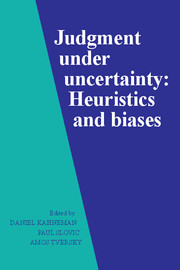Book contents
- Frontmatter
- Contents
- List of contributors
- Preface
- Part I Introduction
- Part II Representativeness
- Part III Causality and attribution
- Part IV Availability
- 11 Availability: A heuristic for judging frequency and probability
- 12 Egocentric biases in availability and attribution
- 13 The availability bias in social perception and interaction
- 14 The simulation heuristic
- Part V Covariation and control
- Part VI Overconfidence
- Part VII Multistage evaluation
- Part VIII Corrective procedures
- Part IX Risk perception
- Part X Postscript
- References
- Index
14 - The simulation heuristic
Published online by Cambridge University Press: 05 May 2013
- Frontmatter
- Contents
- List of contributors
- Preface
- Part I Introduction
- Part II Representativeness
- Part III Causality and attribution
- Part IV Availability
- 11 Availability: A heuristic for judging frequency and probability
- 12 Egocentric biases in availability and attribution
- 13 The availability bias in social perception and interaction
- 14 The simulation heuristic
- Part V Covariation and control
- Part VI Overconfidence
- Part VII Multistage evaluation
- Part VIII Corrective procedures
- Part IX Risk perception
- Part X Postscript
- References
- Index
Summary
Our original treatment of the availability heuristic (Tversky & Kahneman, 1973, 11) discussed two classes of mental operations that “bring things to mind”: the retrieval of instances and the construction of examples or scenarios. Recall and construction are quite different ways of bringing things to mind; they are used to answer different questions, and they follow different rules. Past research has dealt mainly with the retrieval of instances from memory, and the process of mental construction has been relatively neglected.
To advance the study of availability for construction, we now sketch a mental operation that we label the simulation heuristic. Our starting point is a common introspection: There appear to be many situations in which questions about events are answered by an operation that resembles the running of a simulation model. The simulation can be constrained and controlled in several ways: The starting conditions for a “run” can be left at their realistic default values or modified to assume some special contingency; the outcomes can be left unspecified, or else a target state may be set, with the task of finding a path to that state from the initial conditions. A simulation does not necessarily produce a single story, which starts at the beginning and ends with a definite outcome. Rather, we construe the output of simulation as an assessment of the ease with which the model could produce different outcomes, given its initial conditions and operating parameters.
Information
- Type
- Chapter
- Information
- Judgment under UncertaintyHeuristics and Biases, pp. 201 - 208Publisher: Cambridge University PressPrint publication year: 1982
Accessibility standard: Unknown
Why this information is here
This section outlines the accessibility features of this content - including support for screen readers, full keyboard navigation and high-contrast display options. This may not be relevant for you.Accessibility Information
- 724
- Cited by
